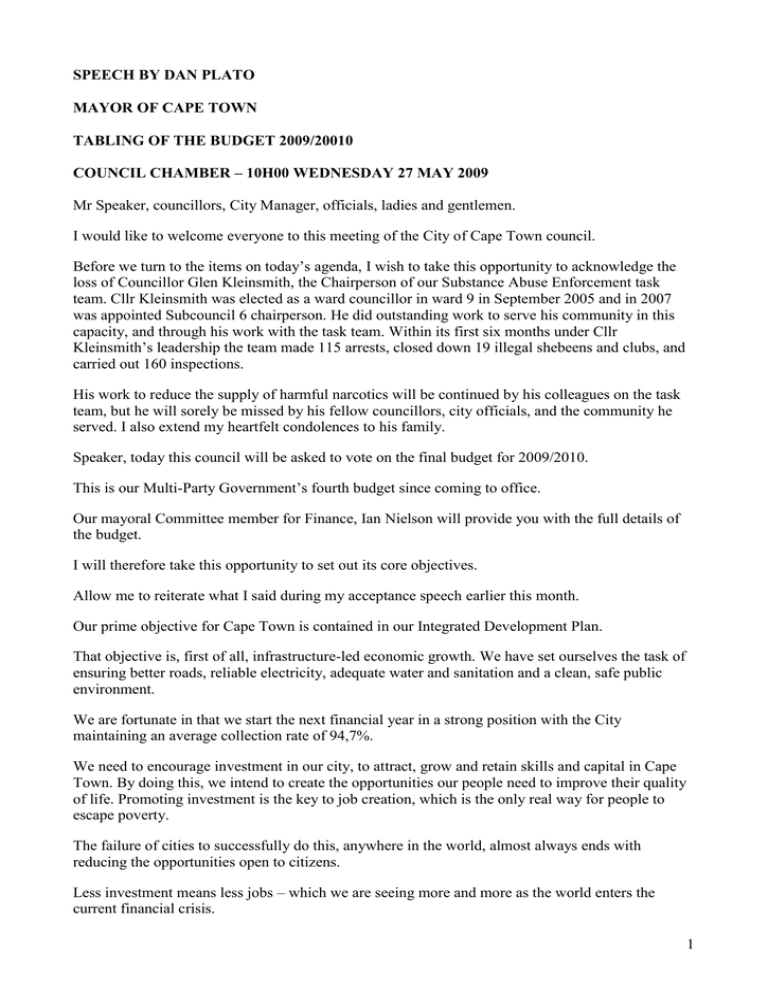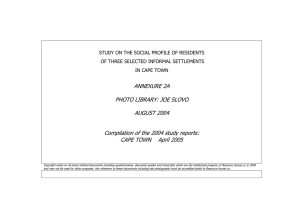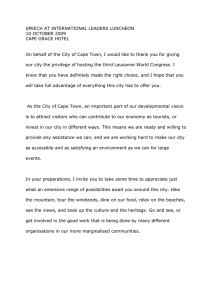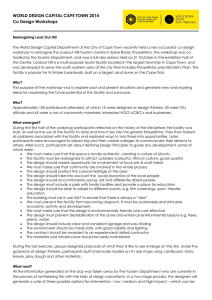SPEECH BY DAN PLATO MAYOR OF CAPE TOWN
advertisement

SPEECH BY DAN PLATO MAYOR OF CAPE TOWN TABLING OF THE BUDGET 2009/20010 COUNCIL CHAMBER – 10H00 WEDNESDAY 27 MAY 2009 Mr Speaker, councillors, City Manager, officials, ladies and gentlemen. I would like to welcome everyone to this meeting of the City of Cape Town council. Before we turn to the items on today’s agenda, I wish to take this opportunity to acknowledge the loss of Councillor Glen Kleinsmith, the Chairperson of our Substance Abuse Enforcement task team. Cllr Kleinsmith was elected as a ward councillor in ward 9 in September 2005 and in 2007 was appointed Subcouncil 6 chairperson. He did outstanding work to serve his community in this capacity, and through his work with the task team. Within its first six months under Cllr Kleinsmith’s leadership the team made 115 arrests, closed down 19 illegal shebeens and clubs, and carried out 160 inspections. His work to reduce the supply of harmful narcotics will be continued by his colleagues on the task team, but he will sorely be missed by his fellow councillors, city officials, and the community he served. I also extend my heartfelt condolences to his family. Speaker, today this council will be asked to vote on the final budget for 2009/2010. This is our Multi-Party Government’s fourth budget since coming to office. Our mayoral Committee member for Finance, Ian Nielson will provide you with the full details of the budget. I will therefore take this opportunity to set out its core objectives. Allow me to reiterate what I said during my acceptance speech earlier this month. Our prime objective for Cape Town is contained in our Integrated Development Plan. That objective is, first of all, infrastructure-led economic growth. We have set ourselves the task of ensuring better roads, reliable electricity, adequate water and sanitation and a clean, safe public environment. We are fortunate in that we start the next financial year in a strong position with the City maintaining an average collection rate of 94,7%. We need to encourage investment in our city, to attract, grow and retain skills and capital in Cape Town. By doing this, we intend to create the opportunities our people need to improve their quality of life. Promoting investment is the key to job creation, which is the only real way for people to escape poverty. The failure of cities to successfully do this, anywhere in the world, almost always ends with reducing the opportunities open to citizens. Less investment means less jobs – which we are seeing more and more as the world enters the current financial crisis. 1 And less investment also means less revenue for basic services and subsidised housing for the poor, making it even harder for the poor to gain a foothold in the economy. The budget we will table today seeks a careful balance between the need to attract and sustain investment in Cape Town, and the constitutional imperative to state support for basic rights and socio-economic rights. In terms of attracting investment, our proposed capital budget of R6,2 billion is aimed at continuing the progress we have made so far, which has seen us more than triple our rate of infrastructure spending in three years. Major projects in which we will invest our capital budget include R679 million for electricity infrastructure, R907 million for water and sanitation infrastructure, R810 million for the Integrated Rapid Transit system and R985million for the completion of the Greenpoint Stadium, (an allocation whose funding we are currently finalising with national treasury). R278 million for landfills and another R115 million for the Fisantekraal wastewater treatment works. R107 million for optical fibre broadband infrastructure, R89 million for the completion of the Hospital Bend project. R28 million for Enkanini Informal Settlement Upgrade R20 million for Browns Farm R15 million for Delft (The Hague) And R68 million for Housing Land Acquisition During the past three years of our infrastructure investment programme, our planning department shows that a massive R43 billion has been invested in new developments in Cape Town. The majority of this has been private sector investment on the back of public spending on fixed assets. In the process we created up to 12 000 jobs per year through our Expanded Public Works Programme. We intend to continue this work for the remaining two years of our term of office. By investing in infrastructure and services across the city, and by investing in an organisation that can deliver, we intend to make Cape Town a more attractive destination for investors, both at home and abroad. At the same time, we are also massively increasing our support to the poor, to support basic rights like the right to water, and socio-economic rights like housing. In this way, we want to give our disadvantaged citizens basic support so that they are freed up from the day to day struggle of living in informal settlements without services. This support helps our citizens to seek economic opportunities and participate actively in our democratic systems. We have therefore proposed a total amount of R1.01 billion for free basic services, which is more than double the amount of R456 Million offered only three years ago when we came to office. Tied directly to this is an increase in indigent grants. Mr Speaker, 2 We propose that each household continues to receive 6 000 litres of free basic water per month, and that the first 4 200 litres of sewerage for each household is treated free of charge. We also propose that indigent registered households and all residential properties valued at R199 000 or below will receive a R30.00 indigent grant, which gives an additional 4 500 litres of water and 3150 litres of sewerage treated at a cost of R4.18. We also propose to give 50 free units of electricity to a household if a household buys less then 400 units per month. Our budget will also offer free refuse removal at residential properties which have a value of less than R100 000, and a sliding scale granting relief to those with property valued at less than R300 000. R10 million is to be allocated for rates rebates to pensioners and disabled people with the income threshold lifted to R8 000 per month. These are better rates rebates than have ever been offered under the ANC, and continue the first ever 100% rebates for our poorest residents, which we introduced three years ago. With regards to the progress with water management devices, 30 000 have been installed to date, which results in a monthly saving of around 156 million litres of water, worth over half a million rand Speaker, as a former Member for Housing in our City’s Mayoral Committee, I know that access to housing is one of the core issues that affect our citizens. It is with that in mind that we propose to increase the indigent housing grant to R20 million in order to increase infrastructural development in this sector. It is with great disappointment that I note that the Provincial Government rapidly transferred 1000 hectares of land to the National government the day before the 22 April elections. The City has since 2001 requested that the Provincial Government transfer housing land to the City in terms of the requirements of the Housing Act, to facilitate housing delivery. In addition the City’s Housing Directorate and the Provincial Housing Department have been jointly looking for land to accommodate flood victims during the same period, with little success. We are committed to continuing our work in spite of this move, and hope that we will have a better working relationship with the National Housing Board compared to the difficulties we had with the previous Provincial administration. We are planning to start the following housing projects in the next financial year, which will lead to the creation of 36 280 new housing opportunities: The Hague, Delft 1400 units Happy Valley 21 350 units Kleinvlei 66 units Sercor park 119 units Bardale 3 500 units Kuyasa 150 units Melkbosch 100 units Mfuleni 1 500 flood relief consolidations Mitchells Plain, Eastridge 540 units 3 Nonqubela 2 850 units Nyanga upgrading 1 450 units Philippi East 405 units Site C 1 200 units Wallacedene 1 650 units In order to further improve living conditions in disadvantaged communities, we will also continue to work on our Violence Prevention through Urban Upgrading programme, which has been launched in Khayelitsha, and is starting up in Manenberg as well. Last week we launched four community facilities in Khayeltisha under this programme, namely Peace Park, the Ncomu Road community building, the Ncomu Road Urban Park, and the Kwanfundo School sports complex. These developments will provide safe spaces between the Khayelitsha station and the OR Tambo Hall in Mew Way. Eventually there will be five community buildings, a sport centre, an urban park and safe pedestrian walkways through the Harare community. The R120 million project is a partnership between the City of Cape Town and the German Development Bank and will run over five years. It includes similar facilities which will also be developed in Kuyasa, Site B and Site C. Each area will have secure pedestrian walkways and bicycle tracks, well-managed open spaces, business facilities, sport facilities, public facilities and the so-called ‘active boxes’. These ‘active boxes’ are multifunctional community centres, which will provide places of safety along pedestrian walkways. Typically, these will include a caretaker’s flat, and a room for area patrols. The project is based on community participation, and will offer a platform for residents to get involved in shaping their own suburb to suit their needs and lifestyle. It will involve the cooperation of 50 000 residents in each of the four areas where it will be rolled out. This translates into a total of 200 000 residents or a third of Khayelitsha’s total population of 600 000. It is through initiatives such as these that we can encourage residents in poor communities to take ownership of their infrastructure and services. Several items on the agenda today such as a policy for electricity supply to greenfields developments, the grant application for Khayelitsha libraries, our Indigent grant rental and selling schemes and the request for funding for the Philippi East Development Initiative amongst others, also reiterate our commitment to providing communities with access to basic services where they are needed most. Speaker, to conclude, this is a pro-poor budget, or rather, pro-poverty alleviation. In a time of economic crisis, it offers more support to those in need than any previous budget passed in the history of this city. We are mindful that this is made possible by a huge cross-subsidisation from the ratepayers of Cape Town, and I would like to thank them for helping us to tackle the developmental challenges facing this beautiful city. 4





